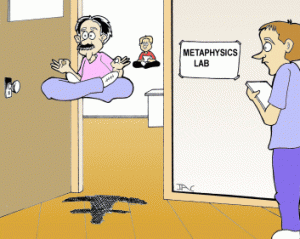 Does the world exist independently of any given human mind? Most of us – including many philosophers – would answer yes, and even think the question itself more than a bit weird. But of course it is possible that we live, say, in a simulation imposed on us by external entities, a la Matrix movie. Or perhaps we are all just instantiations of a single cosmic mind, which we could simply refer to as God.
Does the world exist independently of any given human mind? Most of us – including many philosophers – would answer yes, and even think the question itself more than a bit weird. But of course it is possible that we live, say, in a simulation imposed on us by external entities, a la Matrix movie. Or perhaps we are all just instantiations of a single cosmic mind, which we could simply refer to as God.
This, however, is not what this essay is about. Let us assume for the sake of discussion that the world does exist independently of the human mind. The next, and somewhat more interesting, question is: how do we perceive such world? In the philosophy and metaphysics of perception one position is referred to as naive realism, the notion that we can have, and usually do have, veridical perceptions about the world. What you see, is what you get, so to speak.
I think this position is rather hopeless, and yet it was vigorously defended by a colleague of mine at a recent colloquium at City College. Umrao Sethi, Assistant Professor of Philosophy at Lehman College in New York, gave a talk entitled “Sensible Over-Determination.” In the following I wish to recount an interesting exchange Sethi and I have had during the q&a following her talk, because it puts two views not just of the philosophy of perception, but of philosophy itself, in stark contrast with each other. Please understand that I am not singling out Sethi, but simply using her particular talk to make a more general point about (some) contemporary philosophy.
First, though, here is the abstract of Sethi’s talk. It’s rather technical, so I will explain the relevant bits immediately below:
“I argue that sensible qualities are ‘ontologically flexible’ – they can be instantiated either in virtue of having material bearers or in virtue of being perceived by minds. Given that these qualities have disjunctive conditions on instantiation, a single instance of such a quality can be over-determined – that is, have its existence simultaneously guaranteed both in virtue of having a material bearer and in virtue of being perceived. I make use of this metaphysical insight to show that, contrary to received wisdom, naïve realism is compatible with the possibility of qualitatively matching hallucinations. Both hallucinations and ordinary perceptions acquaint us with instances of the same sensible qualities. While the instances in hallucination are mind-dependent, those in veridical perception are not. The latter are over-determined, and, thus, mind-independent – they can continue to exist unperceived, because, in addition to the minds that perceive them, their existence is guaranteed by the material objects that are their bearers.”
The two key terms here are “hallucinations” and “sensible qualities.” What Sethi was arguing, among other things, is that hallucinations do not present a problem for naive realists. But why would they? The problem goes all the way back to Descartes and his famous thought experiment based on radical doubt. Descartes realized that he could be mistaken about a lot of things, particularly his sensorial perceptions about the world. We all know, for instance, that we can have dreams or hallucinations during which, for a time at least, we cannot tell apart physical reality from what is being conjured up by our minds. If this is the case, Descartes thought, then we can never be absolutely sure of any aspect of our alleged knowledge of the world.
His solution to the problem, famously, was his cogito argument: I may be mistaken about the external world, and even about mathematical or logical truths (because of systematic biases in my reasoning). But there is no way I can be mistaken about the fact that I am a thinking being of some sort. Cogito, ergo sum: I think, therefore I am.
Descartes’ was the last great attempt in philosophy to establish certain foundations of knowledge. And it failed. Sure, I know that I think, but – contra Descartes – that’s pretty much all I will ever know with certainty. There is no way to rebuild knowledge of mathematics, logic, and even less so empirical reality, building on that meager starting point. Most philosophers since have therefore accepted the notion that our knowledge is provisional, and that we could, in principle, be mistaken about all sorts of things.
Not so naive realists, who cling to the hope that we get – most of the times – “veridical” (i.e., true) impressions of the external world via our senses. How so? One path for the naive realist is to reject the argument from hallucination, and show that we can always tell the difference between what our minds conjure and what we perceive about the world.
One way to do this is simply to deny that hallucinations ever feel exactly the same as impression from the external world. I’ve never had a hallucination, but the literature on the subject, seems to me, is pretty clear: at least some of the times, hallucinations (spontaneous, drug-induced, or especially if induced by sensory deprivation) are subjectively indistinguishable from the real thing. In other words, the problem can’t just be swept under the rug.
Sethi conceded this point at least for the sake of discussion, but insisted that we can nevertheless tell the difference. This is where sensible qualities come in. The quintessential one, the one she used the most during her talk, and the very same one that sparked our little debate during the q&a, is color.
Consider a red apple. You may hallucinate a red apple, and “perceive” redness associated with the apple, even though there is no actual apple out there. Or you may perceive redness in the apple because there is, in fact, a red apple that you are looking at. Sethi’s point is that we can tell the difference between these two cases because the second one is “overdetermined,” meaning that there are two reasons we have the first person experience of redness in the case of real objects: (i) because our mind is conjuring one (just like in the case of the hallucination), and (ii) because there is a red apple out there (unlike the case of the hallucination). It is this over-determination that implies mind-independence, according to Sehti.
The problem is – as I pointed out in the q&a – that “redness” is actually not out there (though the apple may be). We know quite a bit about the physiology of color perception and we understand that what is out there are the surface properties of the apple, as well as the characteristics of light at certain wavelengths that can be perceived by the human eye. “Color,” however, results from the specific interaction among those external physical properties and the specific, evolved, sensorial apparatus of a human being. That apparatus includes of course our eyes, with their anatomical and cellular structure, the optical nerve that connects to the brain, and a number of brain systems devoted to the reception and internal representation of what we perceive. Color is not out there, and it is not mind-independent. Ever.
We know this from a variety of sources, including the fact that some human beings (like yours truly) are color-blind (partially, in my case), so that they perceive the exact same external object differently. We also know that other animals do not perceive colors at all (bulls, for instance: when they get mad at someone waving a red cloth in front of them they are reacting to the movement, not the redness of the cloth). Yet other animals perceive colors differently (bees, for example, see ultraviolet, which we cannot perceive).
So what modern science tells us is that the human mind creates a virtual simulation of external reality all the time, and that the veridicity of such simulation depends not just on whatever is out there, but on the details of the human perceptual and cognitive systems. We live in a perpetual Matrix of our own creation, so to speak. That is why we cannot, in fact, always tell the difference between hallucinations and the real world, even if a real, mind-independent world does exist. Descartes was right, and naive realists are wrong.
Here is where things got interesting outside of the narrow scope of an academic talk in a philosophy department. When I pointed out the above to Sethi, her response was that she does not accept the physiological account! Science, she said, is itself based on metaphysical assumptions, and one is free to reject such assumptions. She evidently chose the latter course.
But hold on a second. Yes, science takes certain metaphysical assumptions on board without examination, like the very fact that reality is mind-independent. But I thought (naively, as it turns out!) that a contemporary philosopher is best served by taking very, very seriously whatever science tells us about whatever issue we are discussing philosophically. In this case, to ignore modern physiology and brain science seems hazardous to say the least.
Curious, I asked Sethi why she chose the anti-science path. In other words, what were her metaphysical commitments? Her answer floored me, but also gave me an interesting insight into my own profession. She said that if she went along with standard physiology she would have to agree that consciousness is a biological phenomenon rooted in the brain and how it interacts with the external world.
Again naively, I said, obviously, what else could it be? This is where she mentioned the so-called “hard problem” of consciousness, made famous by NYU philosopher of mind David Chalmers. Here is how the problem is summarized in the excellent entry in the Internet Encyclopedia of Philosophy:
“It is the problem of explaining why there is ‘something it is like’ for a subject in conscious experience … The usual methods of science involve explanation of functional, dynamical, and structural properties – explanation of what a thing does, how it changes over time, and how it is put together. But even after we have explained the functional, dynamical, and structural properties of the conscious mind, we can still meaningfully ask the question, Why is it conscious? This suggests that an explanation of consciousness will have to go beyond the usual methods of science.”
Except that I don’t think one can “meaningfully” ask that at all. I have made the argument that the so-called hard problem is in fact a category mistake. It confuses scientific explanation with first person experience. We may (possibly will) arrive at a complete scientific explanation of consciousness (we are nowhere near, at the moment, but we are making some progress). When we do, however, we will still be unable to feed that explanation into a human mind and have that mind experience, say, redness.
The reason for this is no mystery at all, and does not point to any alleged limitation of scientific explanations. It’s the same reason why we can have a complete understanding of, say, how to ride a bicycle, and yet immediately fall down as soon as we mount one for the first time. Understanding derives from something that philosophers call “knowledge-that,” while the skill required to properly ride a bike is an instance of “knowledge-of.” The two are distinct, the first being conceptual, the second one literally embodied in our biological beings. There is absolutely nothing missing from our understanding if we can’t also ride. Confusing the two is a category mistake analogous to being shown the buildings, faculty, students, and administrations of Oxford University and still ask, “yes, but where is the university?”
The reason I went into some detail into all of this is because I think that Chalmers-style philosophizing is what gives philosophy a bad name. Let me be clear about this: I am on record arguing that philosophy is not the same thing as science, and that not all meaningful philosophical questions have scientific answers (e.g., how should we think of personal identity? or: is modus ponens a kind of valid deductive inference? or: what is a cause?). I am, in other words, not advocating scientism.
But I am advocating the notion that philosophers take science seriously and refrain from inventing questions just because they wish to ignore science and convince themselves that they can go “deeper.” The kind of analytic metaphysics done by Chalmers (and Sethi) does not serve philosophy well, I think, as it ignores or dismisses science at its own peril. Some philosophers have been pushing an alternative approach, which they call “scientific” metaphysics, though I think it would be best described as science-informed metaphysics.
Philosophy, as I have argued recently does make progress, and one example is the acknowledgment of the failure of the rationalist program in epistemology, of which Descartes was the last, valiant defender, and that is in a sense the reference point of analytic metaphysics. Let us then count Descartes’ failure as an example of progress, and not push philosophy back four centuries.










 In a famous essay that was republished as part of his
In a famous essay that was republished as part of his
You must be logged in to post a comment.